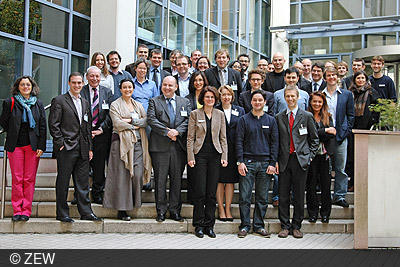Third ICTNET workshop at ZEW
Information EconomyOn October 23 -24 2011, the Centre for European Economic Research ZEW held the third ICTNET workshop in Mannheim. The workshop, which was organised in cooperation with the OECD, addressed first and foremost issues related to ICT-driven innovation, productivity, and growth.
ICTNET, which is a network financed by the EU Commission's Directorate-General for Information Society and Media under the 7th Framework Programme for Research, aims to promote academic exchange among economists – particularly those in Europe – who work in the area of Information and Communications Technologies. In addition, the network seeks to strengthen the political relevance of ICT research. Topically, the network focuses on four fields of ICT research: ICT-driven productivity and growth; R&D and intangible goods; ICT-based innovation; and the diffusion of ICT. The OECD is responsible for the overall coordination of the network. Alongside ZEW, additional coordinating partners in the network are the Imperial College London and the University of Parma.
Goals of the "digital agenda"
The third ICTNET workshop started with a podium discussion. In her keynote Lucilla Sioli, head of unit at the Directorate-General of Information Society and Media, presented the goals of the ‘digital agenda’ and undertook a first assessment of the progress made in attaining these goals. Can investments in high-speed networks and associated mobile applications such as cloud computing facilitate further macroeconomic growth? Under which conditions is it possible to realise a digital single market? These questions were explored by Justin Bayard of Industry Canada, Avi Goldfarb of the University of Toronto, and Marshall van Alstyne of Boston University. Following the podium discussion, 15 researchers presented the results of their studies about the contributions of ICT to innovation, productivity, and growth. Arguing that only urban residents in the U.S. have profited from the introduction of the Internet, Avi Goldfarb presented research results showing that the Internet has only led to an increase in wages in regions with a high population density, high education levels, and high ICT penetration. Marshall van Alstyne of Boston University addressed the innovation potential offered by ICT that depends on the possibility to access and recombine information and – from a firm-perspective - on the internal mechanisms to share information. Additional papers dealt with the contribution of broadband technology to macroeconomic growth, the role of schools as users of broadband technology, as well as the role of the Internet as a job platform.
The automotive industry as an example of an ICT-intensive industry
Johannes van Biesebroeck of KU Leuven examined the automotive industry in order to show how increasing internationalisation has considerably strengthened the productivity and competitiveness of ICT-intensive user industries. Iulia Siedschlag of ESRI Dublin demonstrated similar relationships for the innovation activities of Irish service companies. Other papers presented at the workshop focused on methodological issues – for example, the modelling of complementarities or the measurement of price trends for ICT goods. The workshop programme as well as additional information about ICTNET can be found at: www.ict-net.eu.
